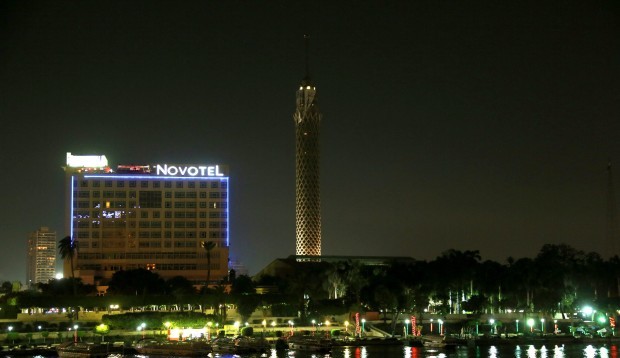“Even in the days when tourists were a target of terrorist acts by extremists, we did not see a decline in business and the number of bookings such as the one today,” a receptionist at a hotel in Cairo said. Of course, the receptionist was comparing the first half of the 1990s, which saw an upsurge of terrorist activities, with the present. Perhaps now the holy month of Ramadan, during which the number of tourists drops, have combined with the tense atmosphere caused by the Muslim Brotherhood’s rallies and threats.
Despite the dramatic events, Cairo in Ramadan remains charming, with people staying up late in the city’s cafes. The difference this time is that people are clearly worried about their future. Waiters’ eyes are fixed on the big screens which most restaurants and cafes have tuned the latest news about when and where protests will be taking place and the statements issued by the government, as well as openly exchanging views among themselves. Everyone, young and old, is talking and breathing politics.
Another difference is that people now carefully plan their journeys to avoid roads and areas the Brotherhood might have blocked. Unfortunately, sometimes traffic is suddenly blocked due to a small Brotherhood protest outside the Rabaa Al-Adawiya and Nahda squares.
Other than that, life appears normal. Restaurants and cafes are crowded and traffic in most areas, away from the Brotherhood’s gatherings, is as busy as usual with a huge number of cars roaming the streets as well as long lines of people waiting in front of sweet shops before Iftar. As for Cairo’s new neighborhoods, people are enjoying their lives and many middle and upper middle class families head to the villages and cities along the northern coast during the summer as usual.
Taxi drivers who some think reflect public mood do not conceal their anger of what they call a “financial crisis” due to a decline of business under the Brotherhood’s rule.
Rumors are rife in Egypt and each is spread and denied several times. However, no one can fail to realize that the public mood, particularly of the middle class, is strongly opposed to the Brotherhood and their allies and the ones staging the rallies in Rabaa Al-Adawiya and Nahda squares as well as traffic blockages. The public often appears to be more firm than the interim government, demanding decisive and rapid measures even if it will cost them a high price. Although the popularity of the military jumped enormously after June 30, no one can guarantee the public’s mood, which is currently hungry for a showdown, will not change if much blood is shed. Most Egyptians do not like to see blood.
Perhaps this is what the Brotherhood is betting on following the historic defeat it suffered after a year in power. The group is currently behaving in a manner tantamount to political suicide, with its unrealistic demands and acts which some liken to acts of revenge on society. The Brotherhood is intentionally turning a blind eye to the public atmosphere opposing its policy, as well as the outrage of the residents in the areas where they are staging rallies.
The Brotherhood made a great mistake by failing to realize that the massive protests on June 30 and after was a sign of impatience at the group’s one-year-rule on the part of the public majority who had a desire for change. There might be many reasons for June 30 among which is the way affairs were administered; however, it is certain that part of the reason lies in the public’s concern over the Brotherhood’s attempt at changing Egyptian’s lifestyles.
How will things end? Probably, as time goes by people will have blown off steam, retained their calm and rethought their plans. The money some say is being used to fund protestors will be exhausted soon. This is not to mention that the public appears to be determined to see change. Challenges facing the interim and future rulers will be enormous especially in the economic sphere. However, restoring stability in itself will give tourism and business an immediate push, which people will be able to see.
